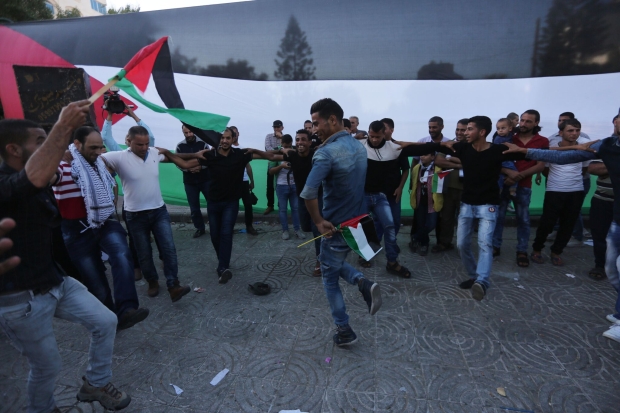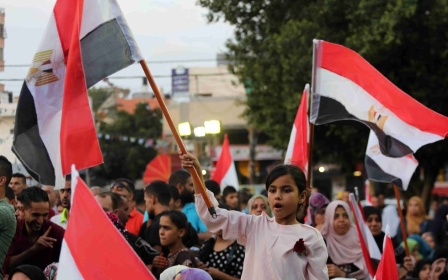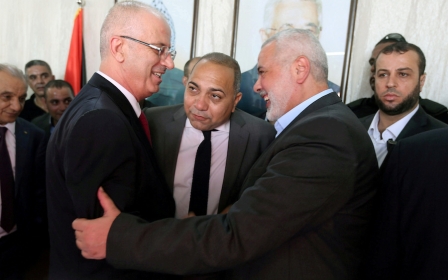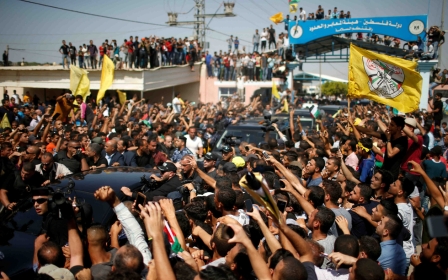Hamas and Fatah sign deal to 'finally and forever' rid Palestine of division
Leaders of Fatah and Hamas on Thursday hailed a unity deal signed in Cairo which they said would end the decade-long rift between the rival Palestinian factions, but many Palestinians expressed scepticism that the agreement would lead to genuine reconciliation.
Palestinian Authority President Mahmoud Abbas welcomed the deal, telling the AFP news agency that he had given orders for it to be signed immediately, following two days of talks mediated by the head of Egypt's general intelligence agency.
"I welcome the agreement reached between the Fatah and Hamas movements in Cairo," said Abbas.
I considered it the final agreement to end the division
- Mahmoud Abbas
"I received a detailed report from the Fatah delegation about what was agreed and I considered it the final agreement to end the division."
The deal was signed by Saleh Arouri, the head of the Hamas delegation, and Fatah leader Azzam Ahmad at a ceremony in the Egyptian capital on Thursday afternoon.
Ahmad later said the deal would "get rid, finally and forever" of the divisions between the West Bank and Gaza leaderships.
The full text of the deal has not been made public. However, it is said to include 3,000 Palestinian Authority police for Gaza, and control of the Rafah crossing passing to the PA.
At a press conference following the signing ceremony, Ahmad said the two sides had agreed that the Rafah crossing which connects Gaza and Egypt would be under the control of Abbas's presidential guard by 1 November.
"The Rafah terminal will be improved and refurbished, and the presidential guards of the PA will be stationed along the Gaza borders by 1 November," Ahmad said.
He added that Abbas had been eager to reach a deal with Hamas, telling the delegation "not return to the Palestinian territory without a deal in the hand".
Ahmad also thanked Khaled Fawzi, the director of Egypt's general intelligence directorate, for supervising the talks.
The deal is also expected to end a number of punitive measures taken by Abbas against Gaza, including reducing electricity payments that left the territory's residents with only a few hours of power a day.
'People are disappointed'
However, many Palestinians remain cautious about the prospects for reconciliation and some questioned the motives of those behind a deal that seeks to end a rift dating back to Hamas's victory in elections in Gaza in 2006.
In Gaza, a few dozen people gathered in Al Jundi Al Majhoul park to mark the deal, with some waving Palestinian flags and dancing. But most people were simply going about their daily lives as usual and appeared unmoved by or dismissive of the deal, a Middle East Eye reporter said.
Some told MEE that they had lost trust in Palestinian leaders, regardless of their political affiliation, and, mindful of the past, did not believe reconciliation to be possible.
Jameel Shahin, a 57-year-old designer, told MEE he hoped the reconciliation deal would prove to be successful.
But he added: “I won’t believe this is a real reconciliation until I see actions on the ground.”
“Solving the borders, electricity, salaries issues in Gaza is still an illusion. People are disappointed, that’s why Al Jundi Al Majhoul is empty.
“This reconciliation is still a lie, they have been 10 years just talking in the air. We see Palestinian leaders on the TV that we never chose to talk and represent us as Palestinians. We don’t even know them, where did they come from?”
Waad Misleh, 20, said: “I am very happy, but I’m scared this is not real. I was 10 years old when the division started; the division is part of my life. I still can’t imagine 24 hours of electricity or open borders.”
Rihab Kanan, 53, said that Gazans were only interested in real solutions rather than in handshakes.
“Unfortunately, our leaders have lost credibility. People are scared to celebrate; people still don’t believe this is real. We don’t want handshakes and decisions in the air, we want [solutions] implemented on the ground. Don’t break us again, don’t disappoint us again.”
Mohammed Al Sultan, 24, said: “We celebrated and fired fireworks five times before, and every time we celebrate the reconciliation fails. How do you want me to be optimistic or even believe that this is true?"
PA wary of Dahlan
Officials spoken to by MEE also hinted at undercurrents of concern within the Palestinian Authority about the role played by Egypt as a mediator in the talks and its support for Mohammad Dahlan, the exiled former Fatah official who is considered one of the main rivals to current PA President Mahmoud Abbas.
"The Egyptians are driven, in these efforts, by their own interests - not our interests,” a senior Fatah official told MEE.
“Egypt is not hiding its support for both Hamas and Dahlan, this is clear, and we have no problem with that,” he said.
“The problem emerges when Egypt conducts this support at our expense,” he said.
In a post on Facebook, Dahlan thanked Egypt and said that the deal would be key in helping to put an "end to sanctions as fast as possible".
He added that the deal would help bring Palestinians together to "form a national unity government in order to prepare for Palestinian elections that include all institutions of the PLO and the Palestinian Authority in the near future".
The Western-backed mainstream Fatah party lost control of Gaza to Hamas, considered a terrorist group by the West and Israel, in fighting in 2007.
"Fatah and Hamas reached an agreement at dawn today upon a generous Egyptian sponsorship," Hamas chief Ismail Haniyeh said in a statement.
Egypt has helped mediate several attempts to reconcile the two movements and form a power-sharing unity government in Gaza and the West Bank.
Hamas and Fatah agreed in 2014 to form a national reconciliation government, but despite that deal, Hamas's shadow government continued to rule the Gaza Strip.
"We congratulate our Palestinian people on the reconciliation agreement reached in Cairo. We make every effort possible to implement it to start a new chapter in the history of our people," Hamas spokesman Hazem Qassem told Reuters.
Delegations from the two rivals have been in talks in Cairo this week to work out the details of the administrative handover, including security in Gaza and at border crossings.
Under the deal, 3,000 Fatah security officers will join the Gaza police force. But Hamas would still have the most powerful armed Palestinian faction, whose estimated 25,000 well-equipped fighters of the Ezzedine al-Qassam Brigades have fought three wars with Israel since 2008.
Both rivals hope the deal’s proposed deployment of security personnel from the Fatah-led Palestinian Authority to Gaza’s borders will encourage Egypt and Israel to lift their tight restrictions at border crossings, a much-needed step to help Gaza revive its economy.
Last month, Hamas agreed to cede civil power in Gaza to the PA but the fate of its vast military wing remains a significant issue for the two sides.
Hamas is blacklisted as a terrorist organisation by the United States and the European Union and the blockaded Gaza Strip has seen deteriorating humanitarian conditions.
Faced with increasing isolation and a severe electricity shortage, Hamas has reached out to Egypt for help, hoping to have the Rafah border opened.
The crossing has remained largely closed in recent years.
Egypt has also agreed to provide fuel to the Gaza Strip for electricity production.
In return, Cairo has pressed Hamas to move forward on reconciliation with rival Fatah and the two sides have launched into the negotiations.
Previous attempts at reconciliation have repeatedly failed, and many analysts are treating the latest bid with caution, waiting to see if actual change will occur on the ground in Gaza.
Last week, PA Prime Minister Rami Hamdallah visited Gaza for the first time since 2015 and his ministers officially took control of government departments in the territory.
But the move was seen as mainly symbolic, with Hamas still effectively in charge in the Palestinian enclave of two million people bordered by Egypt, Israel and the Mediterranean Sea.
Reconciliation could also pose a dilemma for international efforts to reach an Israeli-Palestinian peace deal since Hamas has not recognised Israel, unlike the Abbas-led Palestine Liberation Organisation.
In response Israeli Prime Minister Benjamin Netanyahu said that any Palestinian reconciliation deal must abide by international agreements and terms set by the Middle East Quartet, including the recognition of Israel and disarming of Hamas.
"Israel will examine developments in the field and act accordingly," said an official statement from Netanyahu's office.
Middle East Eye propose une couverture et une analyse indépendantes et incomparables du Moyen-Orient, de l’Afrique du Nord et d’autres régions du monde. Pour en savoir plus sur la reprise de ce contenu et les frais qui s’appliquent, veuillez remplir ce formulaire [en anglais]. Pour en savoir plus sur MEE, cliquez ici [en anglais].





